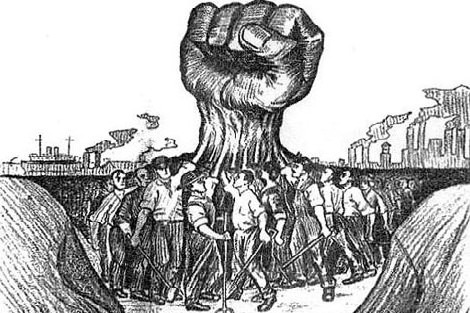Worrying about the future of work has a long and very distinguished intellectual history. People with my politics will always be concerned with work, and how its design and incidence affects people and their communities.
 There is a risk, though, that a focus on the mechanics of work means we miss broader societal change that reinforce and amplify negatives in the labour market.
There is a risk, though, that a focus on the mechanics of work means we miss broader societal change that reinforce and amplify negatives in the labour market.
There are workplace trends in most developed economies that are hurting many people and communities; de-industrialisation, the systematic shifting of risk onto workers in the form of insecure work, the destruction of life-long career paths, stagnant real incomes, and vanishing middle income jobs.
The decline of unions and the weakening of other labour market institutions and protections is both a cause and consequence. The potential for widespread job-killing, as machines with the ability to perform tasks of increasing manual dexterity and cognitive complexity, are developed is being widely discussed.
Although the exact way this plays out is a function of changes and the choices societies make, the labour market issues are old and obvious. Income and job security. The extent to which workers have control over their working life, and therefore their personal life. New types of automation. The challenges are real, but as capable of being dealt with with as they ever have been.
None of these developments should be the end of unionism, although they could be. The more pressing, and infinitely more complex, issue is embedded in our broader culture and environment. The threat to unionism comes from something much more fundamental about identity and individualism.
The Dutch psychiatrist Paul Verhaeghe has written compellingly about the struggle between the sheer pervasiveness of markets and identity. Identity, of course, is always derived from an interaction between the identity holder and the wider environment.
Just as the 'wealth management' industry is based on the lie that anyone can be wealthy if they are just prepared to take enough individual risk in the form of debt, the modern lie about work is that your place depends on a vicious competition with those around you.
"People don't reach for a collective response to their problems in the workplace because such a response is beyond their experience. This is a bicycle that individuals, and even whole societies, can forget how to ride."
This is a sort of sociopathic individualism, one that denies the collective project, where even the team resembles more a gangster faction than a collective. Success is said to be entirely a function of your own efforts, rendering solidarity not just a foreign idea but inimical to your own interests.
Every organiser knows, and fears, the fragility of solidarity. Solidarity can be broken dramatically by force or by the erosion of ties based on locality, religion, occupation or class. But it can also decay from neglect. And with it goes power.
Solidarity is cognitive muscle memory — a learned behaviour that becomes natural through experience and repetition. It's normalised by a widespread incidence of collective action. Seeing others take collective action and win gives others permission to try it. Conversely, the effective absence of collective action, the situation I'd argue we have now with workplace actions like strikes extinct, robs the collective of the legitimacy of familiarity.
People don't reach for a collective response to their problems in the workplace because such a response is beyond their experience — it literally doesn't make sense to them. This is a bicycle that individuals, and even whole societies, can forget how to ride.
This is not an argument for an apolitical unionism. Rather it's a prescription for the creation of an ingrained, sustainable, values-based politics that vaccinates against the lie that self and group interest are necessarily and always opposed.
The experience of successful collective action is the key to recovering what American political scientist Sheldon Wolin called 'politicalness': the 'capacity for developing into beings who know and value what it means to participate in and be responsible for the care and improvement of our common and collective life'.
Organised workers, as any number of studies on voting behaviour and political participation demonstrate, are 'unionist citizens' (I use the latter term in the 1789 sense and not that of the Migration Act). Voting, an action where you ask others to do something for you, is but a small part of this. Organised workers are naturally predisposed to democratic action that builds and preserves a politics of the common good more generally. A focus on winning the state through the parties as the precondition to rebuilding workplace power (and therefore community power) is upside down.
Unions need to recover their identity and their function in society, as organic exercises in group self-improvement — as organisations that are a natural part of the order of human affairs and not defined (and therefore restricted) by their relationship to the state, the law and party politics.
Unions must rebuild the notion of collective as not something you participate in despite your self-interest, but as the only plausible pathway to securing them for almost all people.
As it was, so it will always be. The answer to the challenges of work is to rebuild solidarity of purpose and action. A solidarity unfettered by legal structures of collective bargaining but anchored in human relationships and, yes, in rational self-interest.
 Tim Lyons is a Research Fellow at PerCapita and a former ACTU Assistant Secretary. He tweets @Picketer.
Tim Lyons is a Research Fellow at PerCapita and a former ACTU Assistant Secretary. He tweets @Picketer.
This is the latest article in our ongoing series on work.